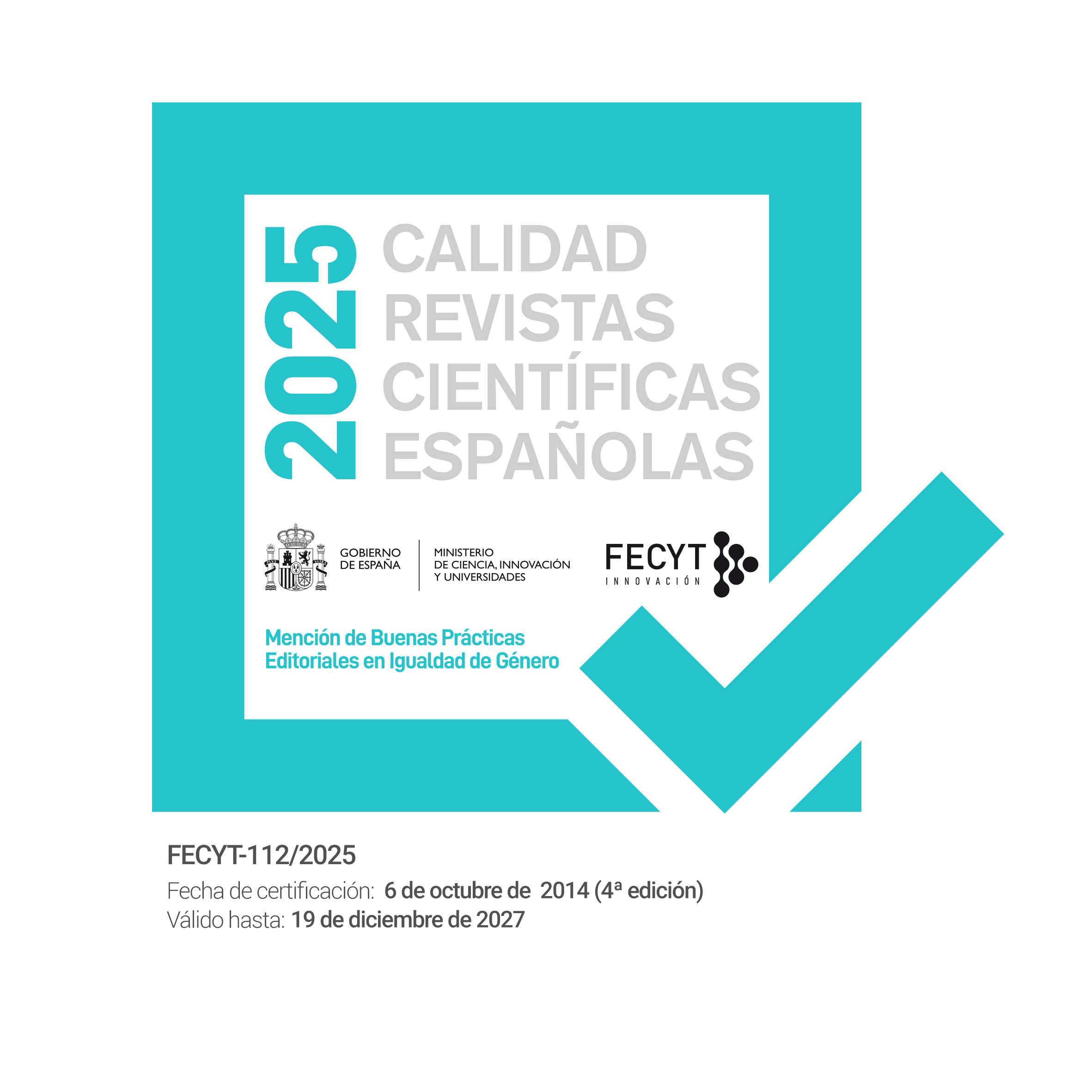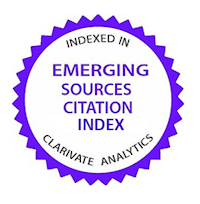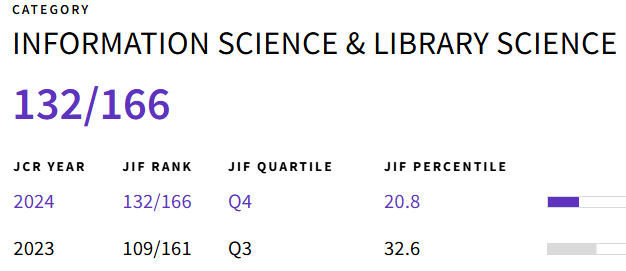Marca personal en entornos académicos
una perspectiva institucional
Resumen
En este estudio se abordan los conceptos de reputación y marca personal y su encaje en entornos académicos. Se propone un modelo de actuación para la construcción de marcas personales de investigadores como guía metodológica que subraya la necesidad de reflexión y de definición de objetivos ante la participación en entornos de relación tanto online como offline. Se profundiza en las características específicas de los ecosistemas digitales académicos en relación con la creación de marcas personales y sus consecuencias. Finalmente, se reflexiona sobre el papel que las universidades y, dentro de ellas, las bibliotecas pueden tener en la creación de marcas personales como fórmula para actuar sobre su propia reputación institucional.
Descargas
Métricas
-
Resumen3488
-
PDF5580
Citas
ALMOUSA, O. Users’ classification and usage-pattern identification in academic social networks. Proceedings of 2011 IEEE Jordan Conference on Applied Electrical Engineering and Computing Technologies. 2011. Disponible en: https://doi.org/10.1109/aeect.2011.6132525.
ALONSO-ARÉVALO, J. Alfabetización en comunicación científica: acreditación, OA, redes sociales, altmetrics, bibliotecarios incrustados y gestión de la identidad digital. En: Alfabetización informacional: reflexiones y experiencias. 2014. Disponible en: <http://hdl.handle.net/10760/22838> [Consulta: 25 de julio de 2018].
BECHER, T. y TROWLER, P.R. Academic tribes and territories: intellectual enquiry and the cultures of disciplines. 2ª ed. Philadelphia: SRHE, Open University Press, 2001. ISBN 033520628X.
BIK, H.M. y GOLDSTEIN, M.C. An introduction to social media for scientists. PLoS Biology, 2013, vol. 11, nº 4, e1001535. Disponible en: https://doi.org/10.1371/journal.pbio.1001535.
BROWN, E. y WOOLSTON, C. Life in the old blog yet: blogging is still a top way to communicate science to a broad readership, researchers say. Nature, 2018, vol. 554, nº 7690, p. 135-137. Disponible en: https://doi.org/10.1038/d41586-018-01414-6.
BROWN, R. Reputation management. Business Information Review, 2010, vol. 27, nº 1, p. 56-64. Disponible en: http://dx.doi.org/10.1177/0266382109357390.
CAMPOS-FREIRE, F. y RÚAS-ARAÚJO, J. Uso de las redes sociales digitales profesionales y científicas: el caso de las 3 universidades gallegas. El profesional de la información, 2016, vol. 25, nº 3, p. 431-440. Disponible en: http://dx.doi.org/10.3145/epi.2016.may.13.
CASTELLS, M. Communication, power and counter-power in the network society. International Journal of Communication, 2007, vol. 1, p. 238-266. Disponible en: <http://ijoc.org/index.php/ijoc/article/view/46> [Consulta: 20 de julio de 2018].
CLIMENT-RODRIGUEZ, J.A. y NAVARRO-ABAL, Y. Branding y reputación: pilares básicos de la visibilidad online del profesor de educación superior. Revista iberoamericana de educación superior, 2017, vol. 8, nº 21, p. 66-76. Disponible en: <http://ref.scielo.org/h2nc8c> [Consulta: 22 de julio de 2018].
CROUZIER, T. Science ecosystem 2.0: how will change occur? 2015 [en línea]. Disponible en: https://doi.org/10.2777/67279.
DE-CASTRO, P. Implantación institucional del identificador ORCID: un nuevo rol para las bibliotecas universitarias. Anuario ThinkEPI, 2015, vol. 9, p. 132-134. Disponible en: http://dx.doi.org/10.3145/thinkepi.2015.31.
ELSAYED, A.M. The use of academic social networks among Arab researchers: a survey. Social Science Computer Review, 2016, vol. 34, nº 3, p. 378-391. Disponible en: https://doi.org/10.1177/0894439315589146.
FERNÁNDEZ-MARCIAL, V. Marketing mix de servicios de información: valor e importancia de la P de producto. Bibliotecas. Anales de Investigación, 2015, vol. 11, p. 64-78. Disponible en: <http://revistas.bnjm.cu/index.php/anales/article/view/4380> [Consulta: 25 de julio de 2018].
FERNÁNDEZ-MARCIAL, V. y GONZÁLEZ-SOLAR, L. Promoción de la investigación e identidad digital: el caso de la Universidade da Coruña. El profesional de la información, 2015, vol. 24, nº. 5, p. 656-664. Disponible en: http://dx.doi.org/10.3145/epi.2015.sep.14.
GALL, D. Librarian like a rock star: using your personal brand to promote your services and reach distant users. Journal of Library Administration, 2012, vol. 52, nº 6-7, p. 549-558. Disponible en: http://dx.doi.org/10.1080/01930826.2012.707952.
GONZÁLEZ-SOLAR, L. La biblioteca universitaria orientada a la investigación: propuesta de un modelo de servicio centrado en el usuario desde la perspectiva del marketing [tesis en línea], 2016. Disponible en: <http://hdl.handle.net/2183/17112> [Consulta: 22 de julio de 2018].
GREIFENEDER, E. et al. Researchers’ attitudes towards the use of social networking sites. Journal of documentation, 2018, vol. 74, nº 1, p. 119-136. Disponible en: https://doi.org/10.1108/JD-04-2017-0051.
HAAK, L.L. Persistent identifiers can improve provenance and attribution and encourage sharing of research results. Information Services & Use, 2014, vol. 34, nº 1-2, p. 93-96. Disponible en: http://dx.doi.org/10.3233/isu-140736.
JENG, W.; HE, D. y JIANG, J. User participation in an academic social networking service: a survey of open group users on Mendeley. Journal of the Association for Information Science and Technology, 2015, vol. 66, nº 5, p. 890-904. Disponible en: https://doi.org/10.1002/asi.23225.
JORDAN, K. Academics and their online networks: exploring the role of academic social networking sites. First Monday, 2014, vol. 19, nº 11. Disponible en: https://doi.org/10.5210/fm.v19i11.4937.
KRAMER, B. y BOSMAN, J. Innovations in scholarly communication: global survey on research tool usage. F1000Research, 2016, vol. 5, p. 692. Disponible en: http://dx.doi.org/10.12688/f1000research.8414.1.
LAIR, D.J.; SULLIVAN, K. y CHENEY, G. Marketization and the recasting of the professional self: The rhetoric and ethics of personal branding. Management Communication Quarterly, 2005, vol. 18, nº 3, p. 307-343. Disponible en: https://doi.org/10.1177/0893318904270744.
LABRECQUE, L.I.; MARKOS, E. y MILNE, G.R. Online personal branding: processes, challenges, and implications. Journal of Interactive Marketing, 2011, vol. 25, nº 1, p. 37-50. Disponible en: http://dx.doi.org/10.1016/j.intmar.2010.09.002.
LOWENTHAL, P.R.; DUNLAP, J.C. y STITSON, P. Creating an intentional web presence: strategies for every educational technology professional. TechTrends, 2016, vol. 60, p. 320-329. Disponible en: https://doi.org/10.1007/s11528-016-0056-1.
LUPTON, D. Feeling better connected’: academics’ use of social media. Canberra: University of Canberra, 2014 [en línea]. Disponible en: <http://apo.org.au/system/files/53908/apo-nid53908-48756.pdf> [Consulta: 13 de abril de 2018].
MARAURI-CASTILLO, Í.; CANTALAPIEDRA-GONZÁLEZ, M.-J. y ÁLVAREZ-FERNÁNDEZ, C. Blog y Twitter, la combinación perfecta del comunicador digital: los casos de Escolar.net, El comidista y Mi mesa cojea. El profesional de la información, 2018, vol. 27, nº 2, p. 349-358. Disponible en: http://dx.doi.org/10.3145/epi.2018.mar.13.
MARTIN-MARTIN, A.; ORDUÑA-MALEA, E.; HARZING, A.-W. y DELGADO LÓPEZ-CÓZAR, E. Can we use Google Scholar to identify highly-cited documents? Journal of Informetrics, 2017, vol. 11, nº 1, p. 152-163. Disponible en: https://doi.org/10.1016/j.joi.2016.11.008.
MARWICK, A.E. y BOYD, D. I tweet honestly, I tweet passionately: Twitter users, context collapse, and the imagined audience. New Media & Society, 2010, vol. 13, nº 1, p. 114-133. Disponible en: http://dx.doi.org/10.1177/1461444810365313.
MATTHEWS, D. Scholars launch non-profit rival to ResearchGate and Academia.edu. Times Higher Education, 2017 [en línea]. Disponible en: <https://www.timeshighereducation.com/news/scholars-form-non-profit-rival-to-researchgate> [Consulta: 5 de abril de 2018].
NÁNDEZ, G. y BORREGO, A. Use of social networks for academic purposes: a case study. Electronic Library, 2013, vol. 31, nº 6, p. 781-791. Disponible en: https://doi.org/10.1108/el-03-2012-0031.
NATURE RESEARCH. Springer Nature 2017 Social Media Survey: Data. [en línea]. Disponible en: https://doi.org/10.6084/m9.figshare.5028212.v1.
NICHOLAS, D. et al. New ways of building, showcasing, and measuring scholarly reputation. Learned Publishing, 2015, vol. 28, nº 3, p. 169-183. Disponible en: https://doi.org/10.1087/20150303.
NICHOLAS, D.; HERMAN, E. y JAMALI, H.R. Emerging reputation mechanisms for scholars [en línea]. 2015. Disponible en: <http://publications.jrc.ec.europa.eu/repository/bitstream/JRC94955/jrc94955.pdf> [Consulta: 12 de abril de 2018].
OPEN SCIENCE SKILLS WORKING GROUP. Providing researchers with the skills and competencies they need to practice open science. 2017 [en línea]. Disponible en: <https://ec.europa.eu/research/openscience/pdf/os_skills_wgreport_final.pdf#view=fit&pagemode=none> [Consulta: 13 de abril de 2018].
ORTEGA, J.L. y AGUILLO, I.F. Microsoft academic search and Google Scholar citations: a comparative analysis of author profiles. Journal of the American Society for Information Science and Technology, 2014, vol. 6, nº 6, p. 1149-1156. Disponible en: https://doi.org/10.1002/asi.23036.
ORTEGA, J.L. Disciplinary differences in the use of academic social networking sites. Online Information Review, 2015, vol. 39, nº 4, p. 520-536. Disponible en: https://doi.org/10.1108/oir-03-2015-0093.
ORTEGA, J.L. Redes sociales académicas: ¿espacios colaborativos o clubes Diógenes? Anuario ThinkEPI, 2017a, vol. 11, p. 225-229. Disponible en: http://dx.doi.org/10.3145/thinkepi.2017.42.
ORTEGA, J.L. Toward a homogenization of academic social sites: A longitudinal study of profiles in Academia.edu, Google Scholar Citations and ResearchGate. Online Information Review, 2017b, vol. 41, nº 6, p. 812-825. Disponible en: https://doi.org/10.1108/OIR-01-2016-0012.
RANGARAJAN, D.; GELB, B.D. y VANDAVEER, A. Strategic personal branding: and how it pays off. Business Horizons, 2017, vol. 60, nº 5, p. 657-666. Disponible en: http://dx.doi.org/10.1016/j.bushor.2017.05.009.
ROTENBERG, E. y KUSHMERICK, A. The author challenge: identification of self in the scholarly literature. Cataloging and classification quarterly, 2011, vol. 49, nº 6, p. 503-520. Disponible en: http://dx.doi.org/10.1080/01639374.2011.606405.
SCHAWBEL, D. Me 2.0: Build a Powerful Brand to Achieve Career Success. New York: Kaplan, 2009.
SHANKS, J. y ARLITSCH, K. Making Sense of Researcher Services. Journal of Library Administration, 2016, vol. 56, nº 3, p. 295-316. Disponible en: http://dx.doi.org/10.1080/01930826.2016.1146534.
SMITH, D.R. Are you failing at scientific social media? EMBO reports, 2015, vol. 17, nº 2, p. 123-124. Disponible en: http://dx.doi.org/10.15252/embr.201541782.
SMITH-YOSHIMURA, K. et al. Registering researchers in authority files. Ohio: OCLC Research, 2014. Disponible en: <https://files.eric.ed.gov/fulltext/ED564924.pdf> [Consulta: 23 de julio de 2018].
SOLOVE, D.J. The future of reputation: gossip, rumor, and privacy on the Internet. New Haven: Yale University Press, 2007.
STEWART, B. Open to influence: what counts as academic influence in scholarly networked Twitter participation. Learning, Media and Technology, 2015, vol. 40, nº 3, p. 287-309. Disponible en: https://doi.org/10.1080/17439884.2015.1015547.
THELWALL, M. y KOUSHA, K. Academia.edu: social network or academic network? Journal of the Association for Information Science and Technology, 2014, vol. 65, nº 4, p. 721-731. Disponible en: https://doi.org/10.1002/asi.23038.
THELWALL, M. y KOUSHA, K. ResearchGate articles: age, discipline, audience size and impact, Journal of the Association for Information Science and Technology, 2017, vol. 68, nº 2, p. 468-479. Disponible en: https://doi.org/10.1002/asi.23675.
VAN NOORDEN, R. Online collaboration: scientists and the social network. Nature, 2014, vol. 512, nº 7513, p. 126-129. Disponible en: https://doi.org/10.1038/512126a.
WELLER, M. The digital scholar: how technology is transforming academic practice. London: A&C Black, 2011. Disponible en: http://dx.doi.org/10.5040/9781849666275.
WELLER, M. Digital Scholarship and the Tenure Process as an Indicator of Change in Universities. Revista de Universidad y Sociedad del Conocimiento, 2012, vol. 9, nº 2. Disponible en: http://dx.doi.org/10.7238/rusc.v9i2.1398.
WOODSIDE, A.G. Brand-consumer storytelling theory and research. Psychology and Marketing, 2010, vol. 27, nº 6, p. 531-540. Disponible en: http://dx.doi.org/10.1002/mar.20342.
Las obras que se publican en esta revista están sujetas a los siguientes términos:
1. El Servicio de Publicaciones de la Universidad de Murcia (Editum) conserva los derechos patrimoniales ('copyright') de las obras publicadas, y favorece y permite la reutilización de las mismas bajo la licencia de uso.
2. Las obras se publican en la edición electrónica de la revista bajo la licencia Creative Commons Atribución Internacional CC BY 4.0. Se puede copiar y redistribuir el material en cualquier medio o formato y remezclar, transformar y crear a partir del material para cualquier finalidad, incluso comercial.







